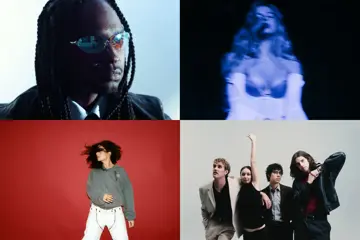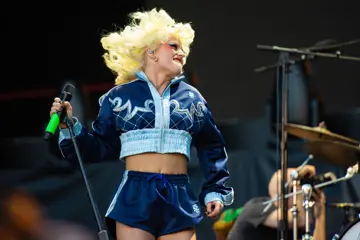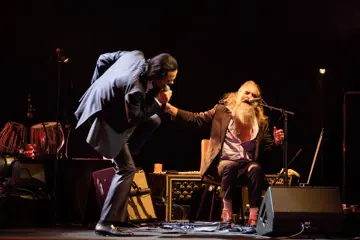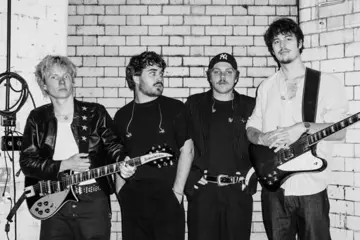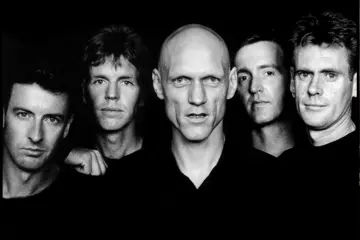You remember the song 'Radar Detector' - the perpetually fun anthem that was conceived by the curly headed dude who we know and love as DARWIN DEEZ. Well the man is back, as he is set to release his sophomore record Songs For Imaginative People.
Compared to his debut, Darwin's upcoming release has been described as quite melancholic, despite the quirkiness that emits from the rest of his colourful catalogue.
Having said that, expect bigger things from the new record as Darwin has entered a whole new realm of sonic exploration. He's been experimenting with new sounds, has added a bluesy element to his rich tonal palette and has created an aural atmosphere comprised of thicker textures and fuller layers.
With the record set to be released in Australia this month, we caught up with Darwin to discuss the new album, the recording process, potential Australian visits and his 2010 DJ set at our former Sydney club, LAST NIGHT.
Considering the time it's taken for Deez to release the sophomore, I was curious to know how long it took to write Songs For Imaginative People.
“I think it took about nine months. I started in December [2011] and I finished in about August or so.”
As previously mentioned, the word "melancholic" has been used a fair bit in reviews for the new record. Was this theme intentional?
“Definitely not. My intention is always to make happy music and uplifting music but I sometimes tend to write melancholy stuff, for some reason.”
As the album is made up of more richer textures and fuller layers, this is the Darwin we'll know from here on in as when I asked if this was him still figuring out his sound, he replied with,
“No, I'd say that if you listen to my first record, there's a sound on it; on every song. That was me finding my sound.”
Not much of a studio dude, Darwin explained why he enjoys recording his own music.
“This is the only way I've ever really made music, just on my own. I've never really done too much stuff in the studio. I just enjoy the privacy of working alone and I enjoy that I can take as much time as I want to on things and I can cut corners the way I want to. To me it's a lot better.”
I asked Darwin what he'd say if he had to wrap up the album in just one sentence. Here's what he had to say (in more than one sentence),
“I'd say.. Hmm. [Thinking] I can't answer that.. I would say that it's indie pop rock. It's indie because I made it all by myself. Indie in the sound of one person, presume one person's sadness and joy. It's pop because the songs are written with listeners in mind. I'm not so much into experimenting you know, I really want this to be for the people. And I'd say it's rock because there's a lot of guitars and some solos even. And it's definitely a lot harder than the last record, has a lot of energy in it. It's not metal, it's not hardcore, it's not punk, it's not classic rock, but it's definitely rock. So yeah that would be it I guess – indie pop rock.”
What track resonates the most with Darwin from the new record?
“Well I sort of like 'Good To Lose'. That song I think has the most to do with life that I've been living in the last year. Having this entire year off to just make this album. I've had a lot of downtime and you kind of just make yourself stressed for no reason I think and you have to constantly remember that your life is great. Also I have this tendency when I don't have anything on my agenda to just stay home and watch TV and you know, mope? Which doesn't make me happy. But um, this song's just kinda like a celebration of how I feel, of what I've done at points in my life.”
After you watch Darwin's clip to 'Free' (a track that can be found on Songs For Imaginative People), you'll feel a sense of entrapment. I asked if there was a personal story behind the tune.
“The personal side behind it is that there's like a Nietzsche reference in the lyrics and there was a time if my life where I felt really trapped and I was really into Nietzsche. When I was eighteen I was chose to go to a college that I ended up really not liking and as soon as I got there I realised that I didn't think and that I wanted to be in New York City instead, but I had to stick it out for a pretty long time. The Nietzsche stuff that I was reading was really depressing me, so the song's kind of about that time in my life. The philosophy that was going around in my head was a lot of stuff about self-improvement and self-criticism and you know, what is truly valuable about – potentially – human life. I didn't really feel like I was living up to anything great at that time in my life. I was just putting a lot of pressure on myself, making myself really unhappy.
There's also a flip side to that song which is that, you know, you can be who you want to be. Especially when you're young and you have your whole life ahead of you – you can really do that. So that's the flip side to it. There's two sides to that song.”
With the album almost at our feet, can we expect an Australian tour?
“Oh definitely, yeah. We'll be there like later in the year, definitely.”
To wrap up the interview, I asked if Darwin remembered DJing at Sydney's former Purple Sneakers club, LAST NIGHT. He sure did! Mentioning the bath robes that he rocked when he and his posse were there, I told him to get down to our Melbourne residence CANT SAY,
"Oh yeah, I'll definitely keep it in mind. We'll be around, I'm sure there'll be some DJ gigs.”
You can snap up a copy of Songs For Imaginative People on 15th February!
Words by Hannah Galvin.



